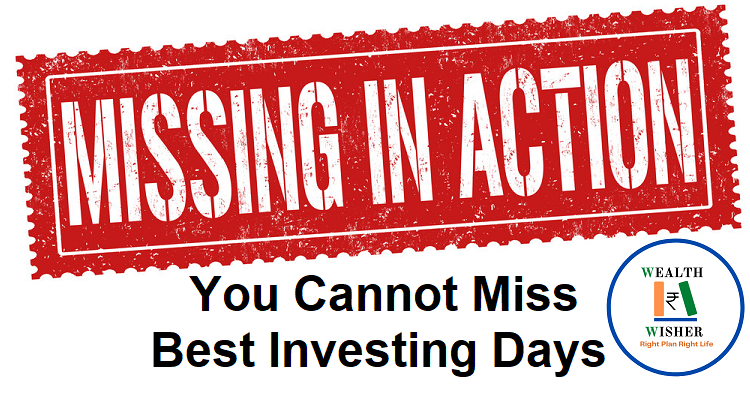Whenever markets increases, investors who have not seen cycles (new investors) start reminding me – Book everything or Exit Equities! And I think this… gosh where you were in 2008 or 2020 or many of the corrections when markets lost 30% or more…! You are telling me to miss some of the Best Investing Days!
The Best Investing Days are … opposite of rising markets. Yes, when it corrects… at least 2%. You know in a year there are 2-3 times a stock or overall markets correct 5% or more.
So corrections or market falls are part of life. Market’s Life.
Being in markets & leaving them dring the BEST Investing DAYS means a whole lot world in Equity Investments.
Just like cricket (you have to quote IPL if you are a Dhoni Fan and he lifts the trophy for the 4th time) it is a case of Losing Catches & Losing the Match.
A missed catch or a minor instance of mis-fielding or even a quick single not taken in a cricket match can prove crucial and change the result. A few unforced errors can prove costly in a game of tennis.
Similarly, small differences can have a big impact in the world of investing too. We all have heard about the power of compounding, but not many truly understand its importance. The mistake of missing Best Investing Days extrapolates as investments get compounded. This makes mistakes also get compounded!
Rs. 1 lakh invested in an asset growing at 9% CAGR (Compounded Annualized Growth Rate) for 35 years (typically, the working tenure of an individual) grows to about Rs. 20.4 lakh.
If we increase the returns by merely 2% (i.e. considering 11% CAGR) in this example, the end value is a staggering Rs. 38.6 lakh, almost double the amount compared to the earlier scenario.
On the importance of 1% compounding – I love this sketch from James Clear’s book Atomic Habits.

In other words, the extent of wealth creation depends critically on where you invest, in addition to how much time you invest the sum for. Most people focus on how much they earn every month or how much they save as well but not as much on where the savings are invested and for how long.
Equities are an essential component of an investor’s overall portfolio, which can give a boost to the overall returns. It may make a small difference to the portfolio returns in a year or two, but that can have a large impact on wealth creation in the long term. Small differences have big consequences.
Depending on your risk appetite and investment horizon, you could consider investing in equities through equity-oriented mutual funds, and more importantly, start early and stay invested for the long term.
So how do you earn that extra 1 or 2%?
By not timing or missing Best Investing Days
Setbacks are common for every sportsperson, and this is true even for champions. The best batsman in the world can be out-of-form in a particular series. There are many examples of athletes, who at the peak of their career, faced injury crises.
However, the mark of true champions is to never give up even during the toughest of times and emerge victoriously. Quitting is the easiest option, but is hardly the best one from a long-term view, be it sports or investing.
Building wealth requires the discipline of staying invested in the market, even if one encounters disappointment in the short run. Exiting prematurely can derail one’s long-term financial goals.
To simplify this statement, let us assume we had invested in the S&P BSE Sensex Index on January 1, 1990, and stayed invested till June 30, 2021. The compounded annual return would have been 14.27%.
Out of the total period of 7,596 days, what if we had missed 10 Best Investing Days?
Means you called ME! (your advisor, and told me to exit for a brief time)
Does not sound like a big impact?
Well, your return would drop to 10.66%!
And Best Investing Days do not KNOCK and ANNOUNCE ARRIVAL!
Let’s have a look at the graph below, which simply highlights the impact on our returns had we missed 10, 20, 30, or even 40 best days:
Daily returns from January 1, 1990, to June 30, 2021.
Source: Internal Calculations based on Data procured from www.bseindia.com
Should this mean we should never exit?
No, this is not what I said. It is prudent to exit equity investments when:
- Exit in case you need money over your contingency fund.
- Book Profits to plan taxes.
- Book Profits from equity if you have an approaching goal.
- You can exit to maintain your Equity Debt ratio (Asset Allocation)
- If the fund/stock is not performing as per mark, you should redeem.
- Exit if the reason (thesis) to make that particular investment has changed.
Otherwise Exiting without reason is –
- Missing a Catch.
- Making unforced errors.
- Compromising long-term returns.
Thanks for reading… do email me or use the comments section to let me know what you think.








